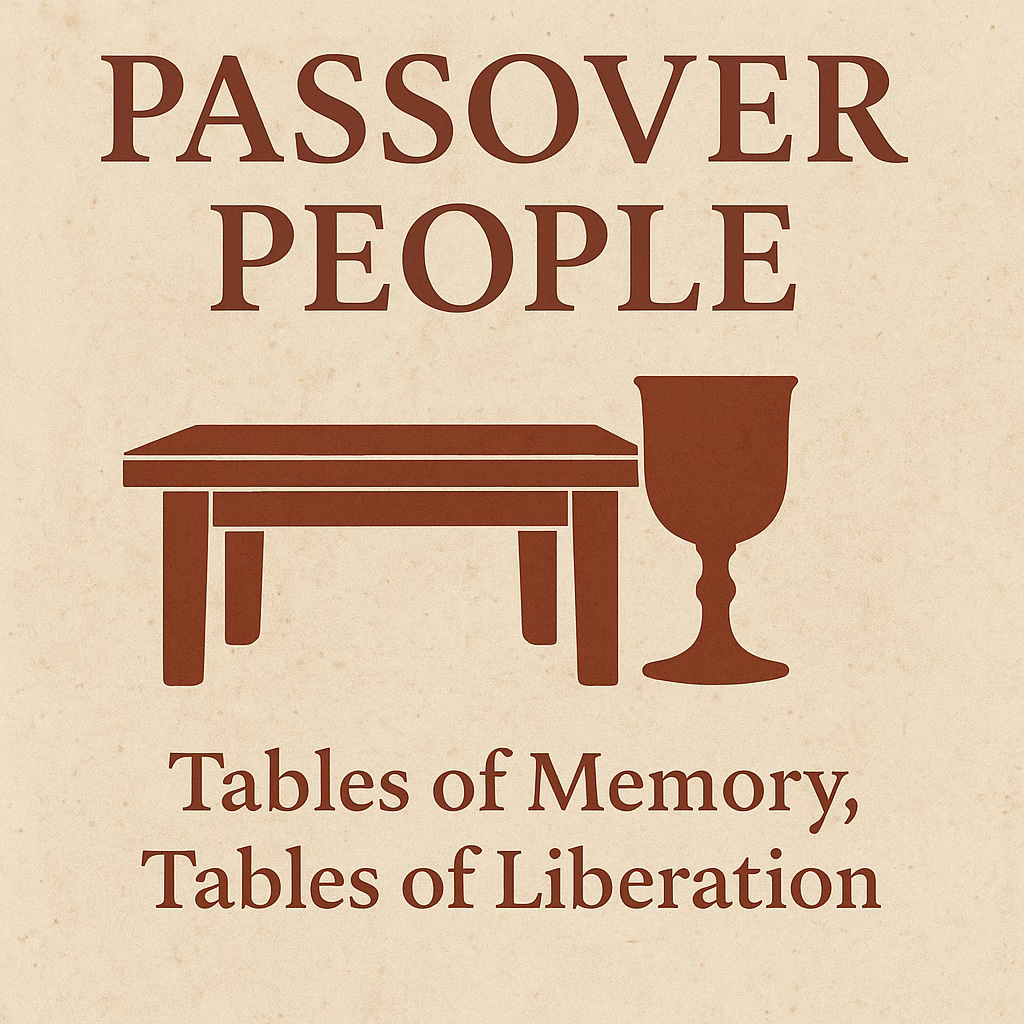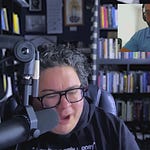🕊️ Sermon Title: Resurrected and Remembered: Jesus the Jew
Texts: John 20:19–31 & Luke 24:36b–48
Theme: Resurrection as recognition, re-membering, and reclaiming
Justice Thread: Reclaiming roots is resistance against Christian supremacy and empire forgetting
Early in the pandemic, I learned how bad my anxiety was and not long after we were in lockdown in Nashville with the rest of the world, I became fearful of leaving our apartment that Erin and I lived in. Soon thereafter, I wouldn’t even go out on the patio, because I was terrified of what was transpiring in the world. Those fears haven’t left, and in fact living with agoraphobia for the past 5 years has taken a toll on me. I am terrified to share this with you and invite you in, because the world does not treat people with disabilities and varying experiences of mental health kindly. People like me get disposed of by society, because I can’t perform a way that the dominant society expects and demands.
I feel like I am in the locked room with the disciples not sure if I should share my story, because as we saw last week, the world crucifies those who tell their stories.
I don’t think I was properly introduced to this community. We weren’t properly introduced to one another. There have been expectations of me that have not been communicated to me in a way that is intelligible to me. There remains expectations of me that never get to me, because we don’t know how to be in relationship with one another quite yet. In fact, there are some people who are angry with me but refuse to talk with me, even after repeated invitations.
We are a church that is in transition. This church had a pastor for 38 years. That’s 38 years of norms and values. I have spent all of my 48 years unraveling from dominant norms and values and embracing an emergent strategy and learning to listen to what is emerging around us.
Transition can be traumatizing. Having a new pastor who talks differently and using a different register of language and analysis is disruptive. I have been called militant by one church member. That same church member told me to assimilate. The next week that church member told me to grow a set of balls. As if a set of testicles can enable me to do this job!
Can you see why I am nervous to share my story?
This church says all are welcome, but I want to be honest with you all this morning.
Erin and I don’t always feel welcome here. I feel like it is a push and pull. Stan came to mediate the Substack and I have been asking for a repair process. White communities never get to invest in a repair process when there has been a rupture with a multiply marginalized person; in this case, me.
People are still hanging onto my Substack and podcast I did with Steve Wrigley who wants to join the church. We said that Alfred has poor dining choices and the mascot is racist. Both of those things are true. Steve and I can see one another in a way that we are able to recognize each other.
How are we going to BE the church if we do not recognize each other?
Transitions can be disruptive for everyone involved. Every decision has a consequence. My decision to remain a public theologian and also a local church pastor has a consequence. I have been told that no other pastor of this church has engaged the community. I have been told by business people and by residents. The consequence is me remaining a public theologian is that people are reading my Substack and listening to my sermons. I ignore interview requests and only go on certain podcasts, now. I continue to be responsive to what is emerging around me and that is a consequence of me being a public figure.
I have not been socialized as a local church pastor in rural America.
I have been groomed to be a public speaker and a public writer. I write to over 19k people each week on my Substack. I work 1:1 with people who have God questions or church hurt or are seeking.
I only know how to respond to what is emergent, because that is my orientation.
If we are going to be resurrection people—people who recognize the risen Christ, can you recognize Christ in me? Do you see Christ in the ones who are joining us? Can you recognize the Spirit among us?
Jesus has called us to remember him. We do that at communion each month, but the command really is a command of recognition. Do you recognize me among you?
These 50 days between Easter and Pentecost are days when the disciples know the story, but are not yeet ready to be an agent of change. They aren’t ready to tell the story. They aren’t ready to recognize themselves and the Christ that lives within them or able to recognize it in others.
⸻
🌒 1. Begin in the Locked Room
John tells us the disciples were hiding behind locked doors.
They were afraid—traumatized, disoriented, unsure what resurrection could even mean in the face of Rome’s overwhelming violence.
And then:
Jesus appears.
And says: Peace be with you.
But he doesn’t come in power.
He comes with wounds.
He shows them his hands and side.
He says: See. Touch. Believe.
This is no ghost. This is no sanitized resurrection.
This is the Jewish body of a teacher who was lynched by the state—
and who rose anyway.
⸻
✡️ 2. Jesus Is Still a Jew
The Jesus who appears is not a new, abstract Christ.
He is still Jesus.
Still Jewish.
Still carrying the prayers and prophecies of his ancestors.
Still quoting Torah.
Still eating fish and blessing meals in the language of his people.
Still recognizing the covenant.
The resurrection does not erase his identity.
It re-members it.
And yet for centuries, the church tried to forget.
It replaced Jesus’ Judaism with triumphalism.
It built theology on the lie that Christians had replaced Jews.
It justified pogroms, Inquisitions, and genocide
by first cutting Jesus off from his own people.
This is supersessionism:
the idea that Christianity has fulfilled and erased Judaism.
But resurrection says otherwise.
⸻
🧠 3. Resurrection as Re-membering
Luke’s gospel shows us another moment.
Jesus appears to the disciples, and they are terrified.
They think he’s a ghost.
He says:
Touch me. I have flesh and bone. I’m hungry. Give me something to eat.
Then he opens their minds to understand the scriptures—
not to replace them,
but to fulfill them.
This is not just a miracle.
It’s a moment of re-membering.
Jesus is gathering what has been dismembered—
not just his body, but the story itself.
He is saying:
“Don’t forget where I come from.
Don’t forget who I come from.
Don’t forget the prophets, the law, the ancestors, the feast days, the longing for liberation.
I am still rooted. I am still Jewish. I am still rising from within the story of my people.”
⸻
🕯️ 4. What Does It Mean for Us to Re-member?
We live in a time of great forgetting.
Where white Christian supremacy still distorts theology.
Where empire demands we forget our stories, our bodies, our lineages.
To follow Jesus is to participate in a different kind of remembering.
• To remember Jesus as a Jew is to confront the harm done in his name.
• To remember resurrection as a bodily, communal, earthy hope is to reject disembodied religion.
• To re-member ourselves is to gather the parts of us we were told to cast aside.
Resurrection is not about perfection. It’s about presence.
It’s not about escape. It’s about return.
⸻
🔥 5. Resurrection as Recognition
Remember what happens when Jesus says Mary’s name in the garden?
She sees him.
Remember what happens when he breaks bread in Emmaus?
Their eyes are opened.
Resurrection is recognition.
Of wounds. Of bodies. Of stories. Of names.
It’s not spectacle—it’s sacred seeing.
So what are we being asked to re-member this week?
• Whose stories are we forgetting?
• What parts of our spiritual lineage have we erased?
• How do we honor Jesus fully—not just as savior, but as son of Miriam, student of Torah, child of occupied Judea?
⸻
🌿 6. We Are Witnesses of These Things
Jesus says:
You are witnesses of these things.
So let’s be clear about what we witness:
• That Jesus was and is a Jew.
• That his resurrection doesn’t erase the body—it blesses it.
• That re-membering is a spiritual discipline, a political act, and a liberating practice.
⸻
🕊️ Closing Charge
To be a resurrection people is not to rush to glory.
It is to stay in the room long enough to touch the wounds,
to share the food,
to honor the roots,
to tell the truth.
Let us be a church that re-members what empire keeps trying to dismember.
Let us rise, not as conquerors,
but as those who see clearly, love deeply, and re-member boldly.
Amen.













